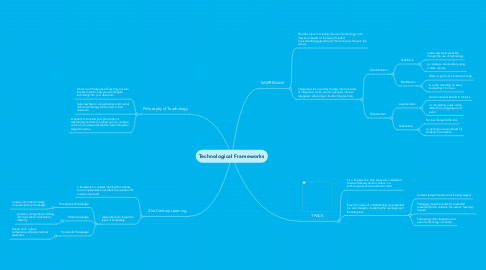
1. SAMR Model
1.1. Provides a lens for viewing the use of technology in the classroom based on the level of student involvement/engagement and the functional change in the activity
1.2. Categorizes the use of technology into four levels of integration, which are then grouped into two categories: enhancing or transforming learning
1.2.1. Transformation
1.2.1.1. Redefintion
1.2.1.1.1. makes new tasks available through the use of technology
1.2.1.1.2. ie. making a documentary using a video camera
1.2.1.2. Modification
1.2.1.2.1. offers a significant functional change
1.2.1.2.2. ie. audio recording an essay and setting it to music
1.2.2. Enhancement
1.2.2.1. Augmentation
1.2.2.1.1. Some functional benefit to the task
1.2.2.1.2. ie. completing a quiz online rather than using paper and pencil
1.2.2.2. Substitution
1.2.2.2.1. No real change to the task
1.2.2.2.2. ie. printing out a worksheet for students to complete
2. TPACK
2.1. it is a framework to help educators understand how to effectively deliver content in a technologically enhanced environment
2.2. three main areas of understanding are presented in a venn diagram, illustrating the overlapping of the categories
2.2.1. Content (subject matter; what is being taught)
2.2.2. Pedagogy (how the content is presented presented to the students; the actual "teaching" aspect)
2.2.3. Technology (the integration and use of technology in schools)
3. Philosophy of Teachology
3.1. similar to a Philosophy of Teaching, but also focuses more on how you will integrate technology into your classroom
3.2. helps teachers to consider when and in what manner technology will be used in their classroom
3.3. important to consider your philosophy of teachnology and later on reflect upon it, and see which of your viewpoints/beliefs have changed or stayed the same
4. 21st Century Learning
4.1. a framework for student learning that outlines core competencies for student to succeed in the modern day world
4.2. categorized into three main types of knowledge
4.2.1. Foundational Knowledge
4.2.1.1. content, information literacy, cross-disciplinary knowledge
4.2.2. Meta Knowledge
4.2.2.1. problem solving/critical thinking, communication/collaboration, creativity
4.2.3. Humanistic Knowledge
4.2.3.1. life/job skills, cultural competence, ethical/emotional awareness
